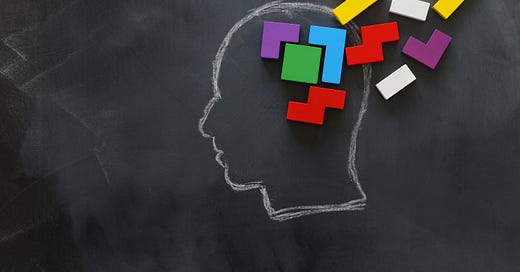"Forgetting is Learning" and More Interesting Research on Memory, Learning, and Social Media Algorithms
For this weekend review I’d like to look into various aspects of memory and learning - the one that has likely attracted your attention, and did the rounds a few weeks ago, is that of forgetting actually being a form of learning!
This sounds attractive to us more forgetful older (and younger people). Now we can say we’ve just learnt something when we’ve forgotten it….ummm is this really the case? I explain below.
But, as many of you know I am a systemic thinker, I see and like to report on connections to other stuff. This same mechanism is also related to group memories and group learning: how we in groups and societies learn and remember collectively - research has also recently been published on this.
And finally, on the same topic, some new pieces have also been published that look at new insights into how memory actually works in the brain and the specific mechanisms that stimulate plasticity and growth of connections in the brain. Read on:
Forgetting is learning
That title is attractive but the paper published sounds more complex. It is titled: Adaptive expression of engrams by retroactive interference. So what does this mean?
First, if we become philosophical we can probably see that forgetting may be a good thing. Why? Well, we need to keep relevant memories and experiences online for effective functioning. We should therefore just remember the important or effective stuff - and most of this functional stuff we need should happen quickly and without much thought.
For example, when typing this I am not remembering where the keys are or all the experiences I had while learning to type - I have “forgotten” most of that. In fact, if I could remember all of that, it might impede or make me less efficient.
So we only need to keep relevant memories online and sometimes we don’t need the memory - just the learnt ability. This means that forgetting helps us keep efficient - removing the junk that we don’t need anymore. This also frees up resources and also keeps us more flexible.
Research by Livia Autore and colleagues Trinity College Dublin has now tried to experimentally prove this forgetting hypothesis. To do this mice were wired up in a technique called optogenetics. This technique allows researchers to see individual brain cells activating but also to activate and deactivate specify brain cells (learn more here). Cool.
What we know is that when two or three things happen together we tend to remember the most relevant. Events therefore compete to become active memories - this can be simulated in mice by remembering objects in different places almost simultaneously and seeing which memories remain active. But now with optogenetics we can actually peer inside the brain and see what is happening to these memories real time. What is happening?
What is surprising is that, yes, these memories do compete and one memory may get the upper hand because, for example, it is more relevant (in mice it might mean getting food). So this shows that some memories are more readily remembered and some forgotten.
However, what they found is that the trace of the previous memory were still there. This means that the forgotten memory could actually be reactivated - in this case by activating the brain cells. But it could also be reactivated by environmental cues - by external stimulation.
In us human beings it may translate into that moment of “I don’t know how I knew that”. This shows that memories are competing for our attention and this is a form of learning - forgetting stuff is a way of learning the most relevant information. But, and the is the interesting bit, these forgotten memories are still present and can still guide our behaviour. Good to know.
That is fascinating and this leads us nicely on to how groups learn and forget because the above research talks about environmental cues - i.e. triggers that help memories reactivate and one of those triggers is our social environment. This research gives additional strong support to the “forgetting is learning” theory.
How groups learn and forget together
Keep reading with a 7-day free trial
Subscribe to leading brains Review to keep reading this post and get 7 days of free access to the full post archives.




